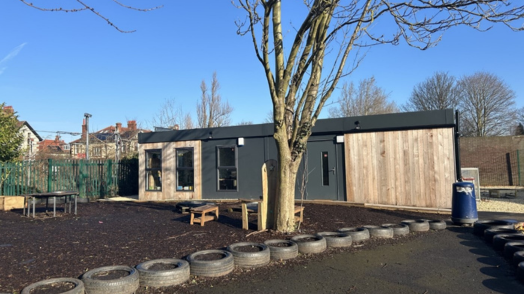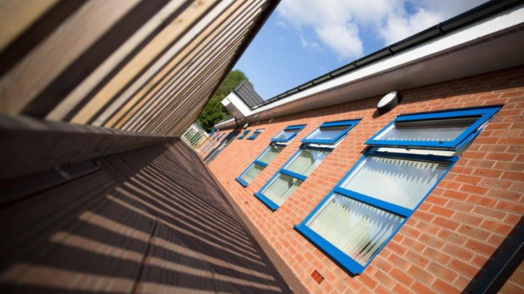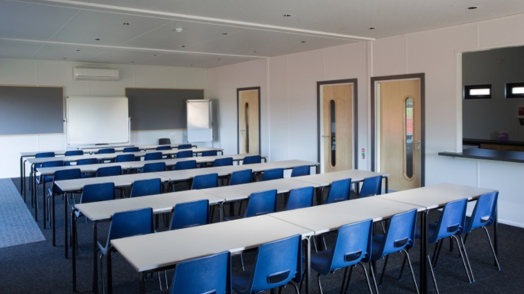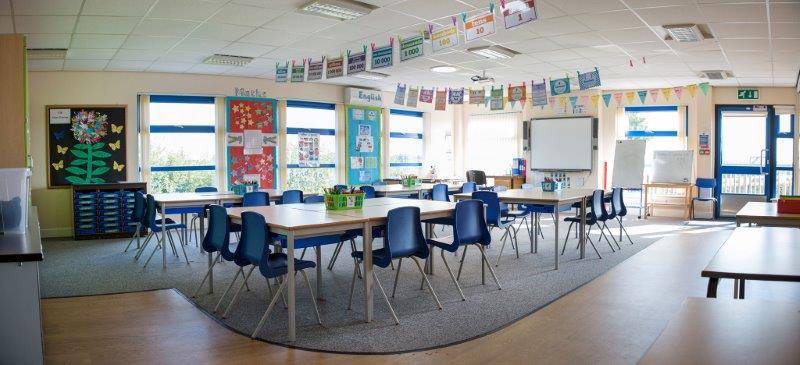Contact our friendly team for more information on our full range of buildings and how to start the process of hiring or buying a modular building for your business. Our expert team is always available to give advice, guidance or support.
Published: 26 July 2024 in Sectors
The Eco-Friendly Advantages of Modular Classrooms for Schools and Nurseries

As a nation, we are becoming increasingly aware of the need to minimise our carbon footprint and adopt more environmentally friendly practices. But when it comes to addressing the ever-growing issue of over-capacity in schools, how can we effectively accommodate the need for more classroom space without the significant environmental that traditional construction methods bring?
Modular classroom construction offers numerous eco-friendly advantages, including reduced material waste, energy efficiency, and fewer carbon emissions. This article explores these benefits and explains how modular construction provides a sustainable alternative to conventional building practices.
Understanding Modular Classroom Construction
Modular classroom construction is a method of building classrooms using prefabricated sections (or modules) in a factory. While modules are being constructed off-site, site preparation occurs simultaneously, such as laying foundations and installing utilities. Once the modules and groundworks are complete, the modules are transported to the construction site and assembled into the final structure.
What Are the Eco-Friendly Advantages of Modular Classroom Construction?
Produces Less Material Waste
One of modular classroom construction’s most significant environmental benefits is the substantial reduction in material waste. Traditional construction methods often lead to excess materials being discarded due to over-ordering or cutting errors. Modular buildings are constructed in factory environments, where materials are cut and assembled with high precision. This controlled process ensures that the exact amount of materials required is used, minimising waste. By reducing overall material waste, we can conserve natural resources and decrease the amount of excess rubbish sent to landfills, lowering the project’s carbon footprint.
Fewer Site Deliveries
Traditional construction projects require numerous deliveries of different materials, contributing to increased carbon emissions. With modular classroom construction, modules are constructed off-site, which means materials can be transported in bulk to the factory, reducing the frequency of deliveries. Additionally, once the modules are complete, they are transported to the site in a single trip. This means lower fuel consumption and emissions from transportation, contributing to a smaller carbon footprint.
Reusable and Portable
Unlike traditional classrooms, modular buildings are designed to be easily dismantled and reassembled as needed, meaning they can be disassembled, relocated, and repurposed as needed. Moreover, even if the initial need for a modular building changes, the structure can be repurposed for other uses, extending its lifecycle and reducing the need for new construction. This reusability means fewer new buildings are needed, conserving resources and reducing the environmental impact of producing new building materials and construction.
Integration of Energy-Efficient Features
Modular classrooms for education can be designed with various energy-efficient features to reduce their environmental impact further. By integrating energy-efficient features such as solar panels to generate renewable energy and high-quality insulation to reduce heating and cooling needs, schools can significantly reduce their energy consumption and also save money.
Less Noise Pollution
The construction process for modular buildings generates less noise pollution than traditional construction methods. Since most of the building is constructed in a factory, the time spent on assembly at the construction site is significantly reduced. Reduced noise pollution benefits the local community by minimising the disturbance caused by construction activities, which is particularly important for schools and nurseries, where a quiet environment is crucial for learning and development.
Reduced Carbon Emissions
Modular construction processes consume less energy than traditional construction methods, as they require less heavy plant machinery, which typically consumes large amounts of fuel and energy. In addition, factory settings allow for more energy-efficient production processes, including optimised use of electricity and heating, which directly translates to a reduced carbon footprint.
Less Disruption to Green Spaces
Unlike traditional construction, which often requires large areas for storing materials, tools, and plant machinery, modular construction involves delivering prefabricated modules ready to be assembled. This compact process requires less space on the construction site and helps preserve green spaces, minimising the ecological footprint of the overall project.
Choosing modular construction for classrooms in schools and nurseries offers a wide range of eco-friendly advantages. By embracing modular construction, we can significantly lower our carbon footprint, conserve natural resources, and create a greener, more sustainable future for the next generation.
If you want to expand your school’s facilities in an environmentally responsible way, consider modular classroom construction. At Springfield, we are dedicated to providing high-quality, eco-friendly modular classrooms that meet the evolving needs of schools and nurseries. Our expertise in modular construction ensures that your project will be completed efficiently, cost-effectively, and with minimal environmental impact.
Make the eco-friendly choice and partner with us for your next classroom expansion. Together, we can create sustainable learning environments that benefit both your students and the planet. Contact us today to learn more about our modular construction solutions and how we can help your school go green.









